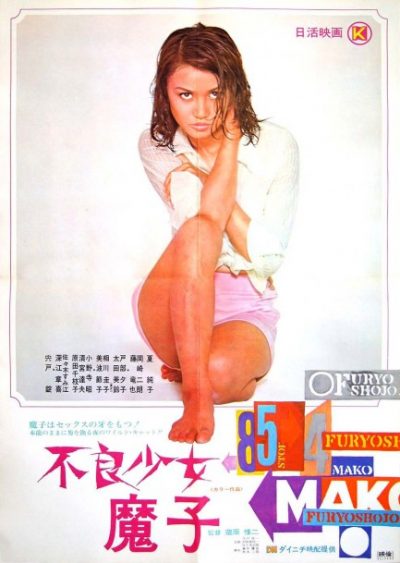★★½
“‘Slightly naughty young lady Mako’ – more accurate, less catchy.”
 This was among the very last of the “pinky violence” films made by the Nikkatsu studio. Their popularity had been waning, and the company, under its president Takashi Itamochi, opted to move in a different direction. They began making what would be known as “roman porno”, leaving the action field open for their rivals at Toei, who picked up Meiko Kaji after her “defection” from Nikkatsu where she had made the Stray Cat Rock series.
This was among the very last of the “pinky violence” films made by the Nikkatsu studio. Their popularity had been waning, and the company, under its president Takashi Itamochi, opted to move in a different direction. They began making what would be known as “roman porno”, leaving the action field open for their rivals at Toei, who picked up Meiko Kaji after her “defection” from Nikkatsu where she had made the Stray Cat Rock series.
I mention all the above, largely because it’s a hundred or so less words I have to write about this, which is one of the more forgettable of their “bad girl” films. While made competently enough, you sense that the heart of the director, making his feature debut, wasn’t particular in it, and title actress Natsu is a poor substitute for Kaji. It begins briskly enough, Mako and her girl gang pals beating up a guy at a bowling alley after he welches on a bet. While visiting a disco, she meets and pretends to fall for Hideo (Okazaki), in what’s really the set-up for a robbery. However, it turns out he has a gang of his own, and thus begins an escalating conflict.
Things are exacerbated by Mako’s brother, Tanabe (Fuji), being a member of the local Yakuza clan, the Yasuoka-Gumi – y’know, the real criminals in town. So for example, after Hideo gets a knife in his leg, he and his mates pay a visit to a Yasuoka-Gumi brothel, and liberate some of their workers. But Mako is also falling for Hideo, a relationship which might as well be wearing a neon sign flashing “doomed”, because he continues to incur the wrath of her brother and the Yakuza bosses. If you manage to predict that the film will end on a close-up of Mako’s face, until a single tear rolls down her cheek, give yourself two points.
It’s a rare moment of artistry in what is, by and large, a rather pedestrian production. From our viewpoint, it needed to concentrate more on Mako, and less on the tit-for-tat shenanigans between Tanabe and Hideo. While she kicks off that storyline, she then largely gets sidelined for much of the picture, until the deaths of various characters (of both sexes) bring her back into play for the final 15-20 minutes. In her absence, the film doesn’t have much to offer, except for low-level thugs snarling at each other, though some of the seventies style on view, in both music and fashion, is not unamusing.
I saw a review of this which said it was, “Obviously a political allegory about the tragic end of the Japanese student movement in the 60s.” Ah. That explains a lot. It being a topic about which I know precious little and care considerably less, would likely go a long way towards determining why this one left me largely underwhelmed.
Dir: Koretsugu Kurahara
Star: Junko Natsu. Jiro Okazaki, Tatsuya Fuji, Joe Shishido




